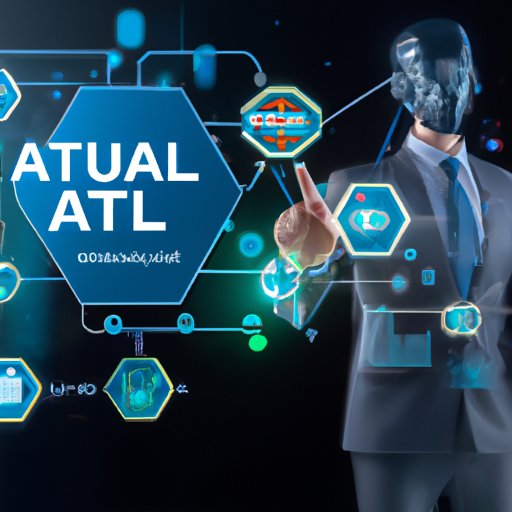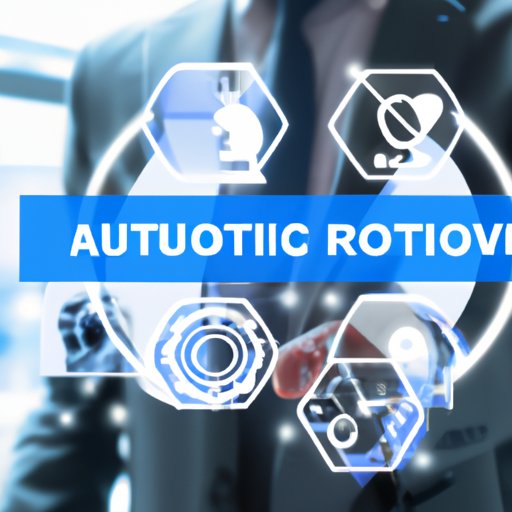Introduction
Artificial intelligence (AI) is rapidly transforming the way businesses operate and interact with customers. By leveraging AI technology, businesses can automate tedious tasks, improve decision making and customer service, and increase productivity and profitability. In this article, we will explore the impact of AI on business, from harnessing its power to enhance business outcomes to examining its role in automating tasks and streamlining workflows. We’ll also look at a case study of a successful AI-powered business.
Harnessing the Power of AI to Enhance Business Outcomes
The potential of AI in business is immense. According to a survey by the McKinsey Global Institute, “AI has the potential to create $13 trillion in additional economic activity by 2030.” This would be equivalent to about one-fifth of total global GDP today. AI technology can help businesses automate mundane tasks, improve decision making and customer service, and increase productivity and profitability.
Automation & Efficiency
AI technology can automate many processes, such as customer service and sales, freeing up employees to focus on more complex tasks. AI-powered chatbots, for example, can provide customer service 24/7, quickly and accurately responding to customer queries and requests. AI technology can also be used to automate repetitive tasks, such as data entry or invoice processing, increasing efficiency and accuracy.
Improved Decision Making & Customer Service
AI technology can help businesses make better decisions faster. By leveraging machine learning and natural language processing, AI can identify patterns in data and provide insights that would otherwise be too time-consuming or difficult to uncover. AI can also be used to personalize customer interactions, providing tailored recommendations and real-time support. For example, AI-powered bots can analyze customer behavior and preferences to provide personalized offers and discounts.
Increasing Productivity & Profitability
AI technology can help businesses increase their productivity and profitability. AI-enabled robots can perform complex tasks faster and more accurately than humans, freeing up resources and reducing costs. AI can also be used to optimize production processes, improving efficiency and reducing waste. Additionally, AI can help companies better understand customer needs and behaviors, allowing them to develop more effective marketing campaigns and increase revenue.

How Artificial Intelligence is Revolutionizing Business Processes
AI technology is revolutionizing how businesses operate. AI can help automate tedious tasks, streamline workflows, and enhance data security and cybersecurity. AI can also be used to leverage big data and machine learning, allowing businesses to gain valuable insights into customer behavior and trends.
Automating Tasks & Streamlining Workflows
AI technology can automate repetitive tasks, such as data entry and customer service, freeing up time and resources. AI-powered bots can also be used to streamline workflows, allowing employees to quickly access and process data. For example, AI-powered bots can detect anomalies in data, alerting employees to potential issues and allowing them to take corrective action.
Enhancing Data Security & Cybersecurity
AI technology can help protect businesses from cyberattacks and data breaches. AI algorithms can detect suspicious activity, alerting businesses to potential threats and allowing them to take preventive measures. AI can also be used to monitor networks and systems, ensuring that they are secure and up-to-date.
Leveraging Big Data & Machine Learning
AI technology can help businesses leverage big data and machine learning to gain valuable insights into customer behavior and trends. By analyzing large amounts of data, businesses can identify patterns and correlations that would otherwise be too time-consuming or difficult to uncover. AI can also be used to develop personalized customer experiences, providing tailored recommendations and real-time support.
Understanding the Impact of AI on Business Decision Making
AI technology can also have a significant impact on business decision making. AI-powered predictive analytics can be used to identify future trends and opportunities, helping businesses make better decisions faster. AI can also be used to improve accuracy and risk management, allowing businesses to optimize resource allocation and reduce costs.
Automated Predictive Analytics
AI technology can be used to automate predictive analytics, allowing businesses to identify future trends and opportunities. AI algorithms can analyze large amounts of data to identify patterns and correlations, providing insights that would otherwise be too time-consuming or difficult to uncover. By leveraging predictive analytics, businesses can make better decisions faster and stay ahead of the competition.
Improved Accuracy & Risk Management
AI technology can also help businesses improve accuracy and risk management. AI algorithms can detect anomalies in data, alerting businesses to potential risks and allowing them to take corrective action. AI can also be used to optimize resource allocation, reducing costs and increasing efficiency.
Examining AI’s Role in Automating Business Tasks
AI technology can also be used to automate business tasks, such as customer service and sales. AI-powered bots can quickly and accurately respond to customer queries and requests, providing personalized customer experiences. AI can also be used to automate repetitive processes, such as data entry and invoice processing, freeing up time and resources.
Automating Repetitive Processes
AI technology can automate repetitive processes, such as data entry and invoice processing. AI-powered bots can quickly and accurately process large amounts of data, freeing up time and resources. AI can also be used to automate customer service, allowing employees to focus on more complex tasks.
Enhancing Personalization & Customization
AI technology can also be used to enhance personalization and customization. AI-powered bots can analyze customer behavior and preferences to provide tailored recommendations and real-time support. By leveraging AI technology, businesses can provide a more personalized customer experience, increasing customer satisfaction and loyalty.
Improving Customer Engagement
AI technology can also be used to improve customer engagement. AI-powered chatbots can provide 24/7 customer service, quickly and accurately responding to customer queries and requests. AI technology can also be used to monitor customer sentiment, allowing businesses to identify areas for improvement and providing insights into customer needs and behaviors.

Exploring the Future of AI in Business
AI technology is rapidly evolving, and the possibilities are endless. Voice-activated AI, autonomous agents and cognitive computing, robotics and augmented reality are just some of the ways AI is being used to transform businesses. The future of AI in business is sure to be exciting, and businesses will need to stay ahead of the curve to remain competitive.
Voice-Activated AI
Voice-activated AI is becoming increasingly popular in businesses. AI-powered voice assistants can be used to automate tasks, such as scheduling meetings and ordering supplies. Voice-activated AI can also be used to provide customer service, allowing customers to quickly and easily find the information they need.
Autonomous Agents & Cognitive Computing
Autonomous agents and cognitive computing are also becoming more prevalent in businesses. Autonomous agents can be used to automate tedious tasks, such as data entry and customer service. Cognitive computing can be used to analyze large amounts of data, providing insights that would otherwise be too time-consuming or difficult to uncover.
Robotics & Augmented Reality
Robotics and augmented reality are also becoming more widely used in businesses. Robotics can be used to automate complex tasks, such as manufacturing and assembly. Augmented reality can be used to provide immersive customer experiences, allowing customers to interact with products in new and innovative ways.

Case Study: The Successful Adoption of AI in Business
To better understand the impact of AI in business, let’s look at a case study of a successful AI-powered business. The company in question is a financial services provider that uses AI technology to automate processes and improve customer service.
Example of an AI-Powered Business
This financial services provider uses AI to automate tedious tasks, such as data entry and customer service. AI-powered chatbots are used to provide 24/7 customer service, quickly and accurately responding to customer queries and requests. AI technology is also used to analyze customer behavior and preferences, allowing the company to provide personalized offers and discounts.
Benefits Realized & Challenges Encountered
The company has realized several benefits since adopting AI technology. Automating tedious tasks has freed up time and resources, allowing the company to focus on more complex tasks. AI-powered chatbots have improved customer service, providing personalized customer experiences and increasing customer satisfaction. However, the company has encountered some challenges along the way, such as the cost of implementing AI technology and the difficulty of integrating AI into existing systems.
Lessons Learned & Recommendations
The successful adoption of AI technology has taught the company several lessons. Firstly, it is important to invest in the right technology and ensure that it is properly integrated into existing systems. Secondly, it is essential to train staff on how to use AI technology, as well as on the benefits and challenges associated with it. Finally, it is important to measure the success of AI initiatives and adjust strategies accordingly.
Conclusion
In conclusion, AI technology is rapidly transforming the way businesses operate and interact with customers. AI technology can help businesses automate tedious tasks, improve decision making and customer service, and increase productivity and profitability. AI can also be used to automate business tasks, such as customer service and sales, and to leverage big data and machine learning to gain valuable insights into customer behavior and trends. As AI technology continues to evolve, businesses will need to stay ahead of the curve to remain competitive.
(Note: Is this article not meeting your expectations? Do you have knowledge or insights to share? Unlock new opportunities and expand your reach by joining our authors team. Click Registration to join us and share your expertise with our readers.)
